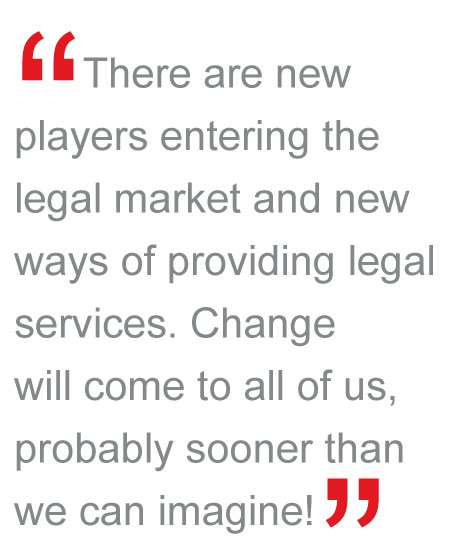What is the future role of lawyers in a rapidly changing world?
Looking ahead we see different business pressures and information technology transforming our economies and social lives. Combined, these pressures cannot but fundamentally change the nature of legal services. Not over the next few months but over the next three to ten years we will see a transformation right across the legal profession.
El profesor Richard Susskind prevé un cambio radical en la naturaleza de los servicios jurídicos, que probablemente no llegue de inmediato pero sí en los próximos cinco o diez años. El futuro traerá nuevos factores de presión para las empresas y despachos, y las nuevas tecnologías transformarán nuestra economía y vida social.
Staying as we are, maintaining the ways we currently work and practise is no longer an option For some this may seem scary, for others exciting. But ultimately we have to look at what it is our customers really want: they do not want to manage legal issues they want to avoid them.
For many law firms the “future” still however presents a continuation of the traditional focus, on one-to-one advisory services, delivered on an hourly billing basis. Such firms may be thinking, can they do this a bit cheaper, a bit better, a bit quicker, but is that really thinking strategically?
KPMG’s mission statement once read: “we exist to turn our knowledge into value for the benefit of our clients”. This is a great way of capturing what professionals do. They apply their knowledge, expertise, insight, and experience to their clients’ particular circumstances.
But it also raises questions about how good professionals are at capturing, nurturing and reusing knowledge. It also suggests that there might be other ways of delivering knowledge.
A recurrent theme among General Counsel is that law firms are far too reactive, they simply respond to questions put to them. But clients do not want dispute resolution they want dispute avoidance. They do not want legal problem solving they want legal risk management. I have yet to meet a Chief Executive who would prefer a really good problem, well resolved, to not having had the problem at all. This is where we can bring real value, now and into the future.
 Currently however there is hardly a law firm in the world that does legal risk management in the way the major accountants do tax risk management. The old way is under challenge but there are lots of new opportunities out there.
Currently however there is hardly a law firm in the world that does legal risk management in the way the major accountants do tax risk management. The old way is under challenge but there are lots of new opportunities out there.
Likewise, we cannot avoid the impact of technology. But there is a clear distinction between automation which can make an existing process more efficient, and innovation, which allows us to do things not previously possible. Most law firms are already quite efficient, the scope for automation is limited, but the scope for innovation is massive.
Looking ahead, I see four fundamental pressures on firms: what I call “more for less”, the move towards commoditisation, the liberalisation of the legal profession, and the growing influence of information technology.
The vast number of General Counsel are under pressure to reduce their internal and external spend but paradoxically they also face more legal compliance work than ever. How we deliver more legal services at less cost will define the next decade of legal services. We perceive each case and each client as different, requiring an individual tailored solution. This is however a fiction. Most legal work, we know in our hearts, is routine and repetitive. Most of what we do could be done by someone else at a lower cost.
To avoid duplication we must move towards standardisation, to making our knowledge and content more readily available, including online. If we can find ways of delivering channels that are cheaper, quicker, more efficient, and convenient, clients will use them.
It is not merely a question of breaking down matters into distinct boxes, but finding the most efficient ways of doing each element. There are new players entering the legal market and new ways of providing legal services. Change will come to all of us, probably sooner than we can imagine, and underpinning all of this will be technology.
The current law firm legacy to junior partners is an old business model from a pre-technology era. The next generation of lawyers want new business models based on technology. The new legal landscape will be different. It presents untold opportunities for new types of highly profitable, socially significant and commercially relevant legal services.
This is an extract from a keynote speach given at Iberian Lawyer’s International Legal Summit. Susskind is an independent adviser to major professional firms and to national governments. His most recent book is The End of Lawyers? Rethinking the Nature of Legal Services.










